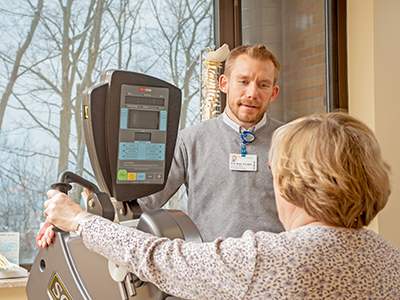Cardiac Rehab

Your cardiologist may recommend Cardiac Rehabilitation to help you return to the highest level of activity and independence possible.
Cardiac Rehab is tailored to meet each individual’s needs. Active involvement by you and your family is vital to your rehab success.
Cardiac Rehabilitation can:
- Decrease your cardiac symptoms and complications
- Encourage independence through self-management
- Improve your social, emotional, and work status
- Increase physical fitness
- Reduce hospitalizations
- Stabilize or reverse atherosclerosis (plaque buildup in the blood vessels)
- Improve your overall quality of life
Reaching Your Goals
Cardiac Rehabilitation informs your health care provider about your clinical status, including:
- Exercise programs to help build your fitness and improve endurance
- Medication management to help reduce cardiac symptoms, complications, and hospitalizations
- Methods to improve independence and activities of daily living
- Nutrition counseling
- Patient and family education and counseling
- Smoking cessation
- Stress management and emotional support
Benefits of Cardiac Rehab
Research shows that Cardiac Rehabilitation benefits people in the following ways:
- Improves cardiac symptoms and psychosocial well-being
- Lowers blood pressure and blood sugar levels
- Provides physicians with valuable surveillance data
- Reduces stress, blood cholesterol levels, cigarette smoking, and death due to heart disease
Heart Conditions
Cardiac Rehabilitation can help restore health after a diagnosis of:
- Angina pectoris
- Cardiomyopathy
- Congestive heart failure
- Coronary artery disease
- Peripheral artery disease
- Certain congenital heart diseases
- Any risk factors for heart disease: abnormal cholesterol levels, high blood pressure, diabetes, smoking, being overweight, sedentary lifestyle, family history, or after having:
- Implantable Cardioverter Defibrillator (ICD)
- Heart attack
- Heart transplant
- Left Ventricular Assist Device (LVAD)
- Open-heart surgery
- PTCA/Stent
- Pacemaker implant
Our Cardiac Rehab Team
The Cardiac Rehabilitation team includes these skilled professionals:
- Dietitians
- Exercise physiologists
- Pharmacist
- Rehabilitation nurses
The team uses research-based interventions to tailor programs for each participant. The program has seven components:
- Cardiovascular evaluation
- Education and counseling about coronary risk reduction
- Exercise training
- Medical surveillance and emergency support when appropriate
- Outcomes documentation and assessment
- Nutritional counseling
- Stress management techniques
Cardiac Support Groups
All present and past cardiac rehab participants, their caregivers, and family members are encouraged to attend monthly Cardiac Support Group meetings held in Frankfort and Traverse. These groups provide an opportunity to connect with other people who are living with the effects of cardiovascular disease. Participants can share their experiences, give and receive emotional support, and learn from each other.
For more information about the Frankfort support group, contact Lorrell Guerra at 231-352-2203.
For more information about the Traverse City support group, contact Jodi Radtke, BSN, RN-C, at 231-935-8560.
Exercise and Education
Phase II Cardiac Rehabilitation is an outpatient program that begins with a preliminary evaluation to determine your cardiovascular status.
This heart-monitored exercise and education program takes place in a medically supervised group setting. Based on preliminary test results, specific exercises are prescribed during sessions held two to three times a week. Individual dietary, exercise and pharmacy counseling is also available.
Ongoing Cardiac Rehabilitation
Phase III Cardiac Rehabilitation allows you to continue medically supervised exercise in a group setting three days a week for one hour. Also available are:
- Educational counseling
- Individual weight management and dietary counseling
- Informative handouts on cardiac-related subjects
- Smoking cessation programs
- Weight training